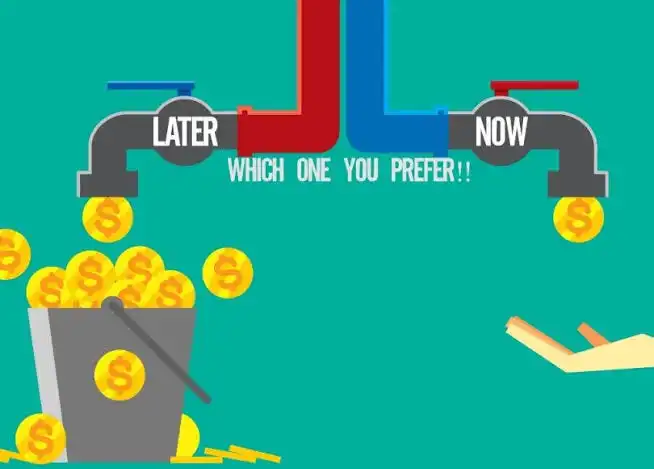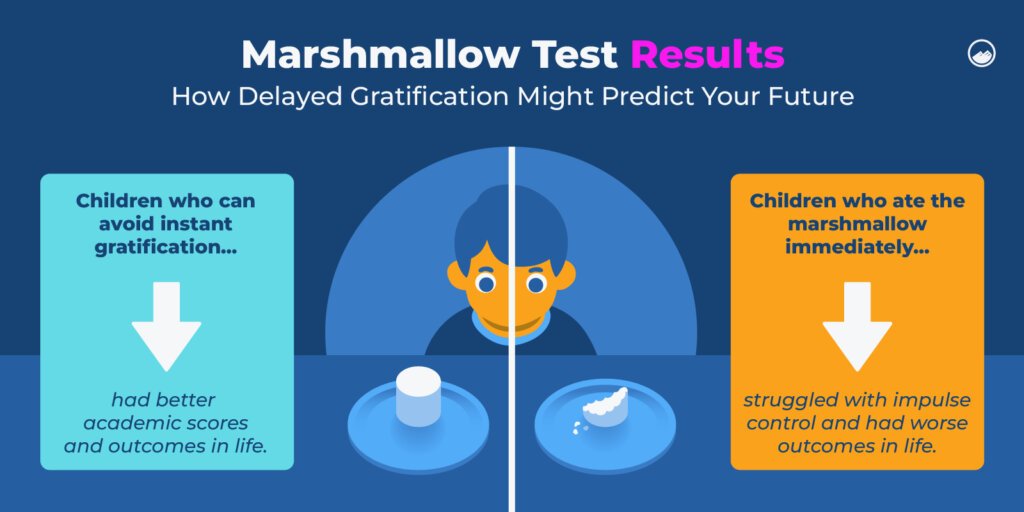A place for Growth

- Jose Flores
Share Article:
The Gateway to Transformation
The concept of delayed gratification often feels counterintuitive. However, those who master this powerful skill find themselves on a path to greater success and happiness. Delayed gratification involves resisting the temptation of an immediate reward in favor of a more substantial, long-term goal. This blog post will explore the benefits of delayed gratification, backed by scientific research, and provide practical tips to help you develop this essential habit.
Understanding Delayed Gratification
Delayed gratification refers to the ability to postpone an immediate pleasure or reward in order to gain a more significant reward later. This concept is often associated with self-control, discipline, and long-term goal setting. It requires making deliberate choices that prioritize future benefits over immediate satisfaction.
The Concept of Delayed Gratification
At its core, delayed gratification is about making choices that may not bring immediate joy but will ultimately lead to greater rewards. This can be seen in various aspects of life, such as:
- Financial Decisions: Choosing to save money instead of spending it on non-essential items, with the goal of achieving financial security or making a significant purchase in the future.
- Educational Pursuits: Investing time and effort in studying for a degree or learning a new skill, with the understanding that this will open up better career opportunities and personal growth.
- Health and Fitness: Sticking to a healthy diet and regular exercise routine, despite the allure of junk food and a sedentary lifestyle, to achieve long-term health benefits.
Why It Matters
Understanding Delayed gratification is crucial for personal development and success. It is linked to higher levels of self-control and better decision-making skills. Individuals who master this ability are often more disciplined, resilient, and focused on their long-term goals.
Example: Consider the effort required to complete a rigorous academic program. The immediate reward might be less free time and increased stress. However, the long-term reward is a degree that can lead to better job prospects and personal satisfaction.
The Science Behind It
Scientific research provides robust evidence supporting the importance of delayed gratification. One of the most notable studies is the Marshmallow Experiment conducted by psychologist Walter Mischel in the 1960s. In this study, children were given a choice: they could eat one marshmallow immediately or wait 15 minutes and receive two marshmallows instead. Follow-up studies showed that children who were able to wait tended to have better life outcomes, including higher academic achievement, better emotional health, and more successful careers.
Reference: Stanford Marshmallow Experiment
Understanding the concept of delayed gratification and its significance is the first step towards integrating this powerful skill into your life. By recognizing the long-term benefits and learning to value them over immediate pleasures, you can set a solid foundation for personal and professional growth.
Related: How to Set SMART Goals

Delayed Gratification vs. Instant Gratification
Related: Habits: The Building Blocks
The Concept of Delayed gratification and instant gratification are two opposing concepts that significantly influence our behavior and decision-making. Understanding the differences between them can help you make better choices aligned with your long-term goals.
What is Delayed Gratification?
Delayed gratification involves forgoing an immediate reward in favor of a more substantial benefit in the future. This requires self-control, patience, and a long-term perspective. Here are some examples to illustrate this concept:
- Saving Money: Choosing to save money for a significant purchase, such as a home or a car, instead of spending it on small, impulsive buys.
- Healthy Eating: Sticking to a balanced diet and avoiding immediate indulgence in unhealthy foods to achieve long-term health benefits.
- Academic Success: Prioritizing study time over social activities to achieve higher academic performance and better career opportunities.
What is Instant Gratification?
Instant gratification is the desire to experience pleasure or fulfillment without delay. It is characterized by a focus on immediate rewards, often at the expense of long-term goals. Examples include:
- Impulse Buying: Purchasing items on a whim, driven by the immediate pleasure of acquiring new things, rather than considering long-term financial goals.
- Procrastination: Choosing to watch TV or browse social media instead of working on a project or studying for an exam.
- Unhealthy Eating Habits: Opting for fast food or sugary snacks to satisfy immediate cravings, despite knowing the negative impact on long-term health.
Distinguishing Between the Two
Recognizing when you are seeking instant gratification can provide an opportunity to practice patience and self-discipline, steering you towards more meaningful and rewarding outcomes. Here’s how to distinguish between the two:
Time Horizon:
Delayed Gratification: Focuses on long-term rewards and benefits.
Instant Gratification: Seeks immediate pleasure and satisfaction.
Decision-Making:
Delayed Gratification: Involves thoughtful decision-making, considering future consequences.
Instant Gratification: Often involves impulsive decisions driven by immediate desires.
Outcome Focus:
Delayed Gratification: Aims for sustained, significant rewards and personal growth.
Instant Gratification: Focuses on short-lived pleasures and quick fixes.
Emotional Regulation:
Delayed Gratification: Requires managing emotions and impulses to stay committed to long-term goals.
Instant Gratification: Tends to be driven by emotional impulses and the need for immediate relief or pleasure.
The Role of Technology and Society
Today’s society, driven by technology and instant services, often prioritizes instant gratification. Social media platforms, online shopping, and fast food are designed to provide immediate rewards. This constant accessibility and convenience make it harder to practice delayed gratification. Understanding this cultural shift is crucial in developing the self-discipline required to focus on long-term goals.
By distinguishing between delayed and instant gratification, you can start making conscious choices that align with your long-term objectives. This awareness is the first step towards cultivating the self-control needed to prioritize significant, enduring rewards over fleeting pleasures.

The illustration used in this post is from Sandstone Care.
Benefits of Delayed Gratification
Delayed gratification offers a multitude of benefits that can significantly enhance various aspects of your life. By understanding and embracing this concept, you can achieve greater success, improve your mental health, and attain long-term financial stability.
Enhanced Self-Control and Discipline
Practicing delayed gratification strengthens your ability to resist impulses and stay focused on your goals. This improvement in self-control and discipline is fundamental to achieving long-term success.
Self-Control: The ability to manage your desires and impulses is crucial for maintaining focus on important tasks. For instance, resisting the urge to check social media while working on a project can lead to better productivity and outcomes.
Discipline: Regularly practicing delayed gratification helps build discipline. Whether it’s sticking to a workout routine or following a study schedule, discipline ensures you stay on the path to achieving your long-term objectives.
Increased Success
Studies consistently show that individuals who can delay gratification tend to achieve higher levels of success in various aspects of life, including education, career advancement, and relationships. This success stems from the ability to set long-term goals and work persistently towards them.
Educational Achievement: Students who delay gratification by prioritizing their studies over leisure activities tend to perform better academically. This academic success can lead to more opportunities and better career prospects.
Career Growth: Professionals who invest time in further education and skill development, rather than settling for immediate job satisfaction, often achieve higher career success and better financial rewards.
Personal Relationships: Delaying gratification can also improve personal relationships. For instance, investing time and effort in nurturing relationships rather than seeking immediate gratification through fleeting interactions leads to deeper, more meaningful connections.
Reference: The Role of Delayed Gratification in Achieving Success
Improved Mental Health
Delayed gratification is linked to better mental health outcomes, as it reduces impulsive behaviors that often lead to stress and anxiety. By learning to manage impulses and prioritize goals, individuals experience greater emotional stability and satisfaction.
Reduced Stress: Individuals who practice delayed gratification are less likely to engage in impulsive behaviors that lead to stress, such as overspending or overeating. This reduction in impulsivity contributes to overall mental well-being.
Emotional Stability: Delayed gratification fosters emotional resilience. By focusing on long-term goals and managing immediate desires, individuals develop a more stable emotional outlook, leading to better mental health.
Reference: Delayed Gratification and Mental Health
Financial Stability
Learning to delay gratification can lead to better financial habits, such as saving money and avoiding unnecessary expenses. This financial discipline contributes to long-term stability and security.
Savings: By prioritizing long-term financial goals, such as saving for retirement or a major purchase, individuals who practice delayed gratification can achieve greater financial security.
Debt Reduction: Avoiding impulsive purchases and managing spending habits effectively helps in reducing debt and achieving financial freedom.
Investment Growth: Delaying gratification can also lead to smarter investment decisions, as individuals are more likely to consider long-term gains rather than short-term returns.
Scientific Insights
One of the most famous studies on delayed gratification is the Marshmallow Experiment conducted by psychologist Walter Mischel in the 1960s. In this study, children were offered a choice between one small reward provided immediately or two small rewards if they waited for a short period. The results showed that children who were able to wait tended to have better life outcomes, including higher academic achievement and better emotional health.
Long-Term Study: Follow-up studies revealed that the ability to delay gratification in childhood predicted various positive outcomes in adulthood, such as better academic performance, higher SAT scores, and healthier body mass index (BMI).
Behavioral Insights: The study highlighted the role of self-control in long-term success and well-being. It underscored the importance of teaching children and adults strategies to improve their ability to delay gratification.
The Challenge of Delayed Gratification
Delayed gratification poses significant challenges in today’s fast-paced society, where instant gratification is readily available and often encouraged. Understanding these challenges is essential for developing the self-discipline and perseverance necessary to prioritize long-term goals over immediate desires.
Cultural Influence and Technology
Instant Gratification Culture: Modern advancements in technology, such as smartphones and social media platforms, have contributed to a culture of instant gratification. These technologies provide immediate access to information, entertainment, and consumer goods, conditioning individuals to expect instant rewards.
Social Media: Platforms like Instagram and TikTok offer instant validation through likes and comments, influencing behavior towards seeking immediate social approval.
Online Shopping: E-commerce platforms provide quick and convenient access to products, encouraging impulse buying and instant fulfillment of desires.
Fast Food and Convenience: Fast food chains and delivery services cater to the desire for immediate satisfaction, making unhealthy food choices more accessible.
Psychological Impacts
Impulsivity and Decision-Making: The prevalence of instant gratification can weaken self-control and increase impulsivity. Individuals may struggle to resist temptations and make impulsive decisions that prioritize short-term pleasures over long-term benefits.
Stress and Anxiety: The pressure to meet immediate demands and expectations can lead to stress and anxiety. Constantly seeking instant rewards can create a cycle of emotional instability and dissatisfaction.
Attention Span and Focus: Continuous exposure to instant gratification stimuli, such as notifications and quick entertainment, can shorten attention spans and reduce the ability to concentrate on long-term goals.
Economic Factors
Consumerism and Spending Habits: The consumer-driven economy encourages spending and consumption, often promoting instant gratification over prudent financial management. Advertising strategies capitalize on impulses and desires, prompting immediate purchases.
Debt and Financial Instability: Impulsive spending and a lack of financial planning can lead to debt accumulation and financial instability. Delaying gratification requires discipline to prioritize savings and long-term financial goals.
Educational and Career Challenges
Academic Performance: Students may struggle with procrastination and short-term focus, impacting their ability to achieve academic success. Effective study habits and goal-setting are essential for overcoming these challenges.
Career Advancement: Professionals navigating a competitive job market must balance short-term career gains with long-term career aspirations. Developing skills and pursuing opportunities that align with long-term goals requires strategic planning and perseverance.
Overcoming the Challenges
Recognizing the societal pressures and personal tendencies towards instant gratification is the first step in overcoming these challenges. Here are strategies to foster delayed gratification:
- Mindfulness and Awareness: Practice mindfulness techniques to become more aware of impulses and triggers that lead to instant gratification.
- Goal Setting and Planning: Set clear, achievable goals with defined timelines to stay focused on long-term objectives.
- Self-Control Exercises: Engage in activities that strengthen self-control, such as meditation, physical exercise, and cognitive behavioral techniques.
- Support Systems: Surround yourself with supportive individuals who encourage and reinforce your commitment to delayed gratification.
Case Study: Teaching Delayed Gratification
In educational settings, teaching delayed gratification can have profound effects on student outcomes. Educators can incorporate strategies such as reward systems for long-term goals, teaching time management skills, and emphasizing the benefits of persistence and resilience.
- Educational Programs: Schools and educational institutions can implement programs that teach students the value of delayed gratification through experiential learning and real-world applications.
- Parental Influence: Parents play a crucial role in modeling and teaching delayed gratification to children. Encouraging delayed gratification behaviors at a young age can have lasting effects on their personal and academic success.
Navigating the challenges of delayed gratification in a culture that promotes instant satisfaction requires conscious effort and determination. By understanding the psychological, economic, and societal influences at play, individuals can develop strategies to prioritize long-term goals, achieve personal growth, and cultivate resilience in the face of immediate temptations.

Strategies to Develop Delayed Gratification
Developing the ability to delay gratification is a valuable skill that can lead to long-term success and personal growth. Here are some practical strategies to help you cultivate this essential habit.
Set Clear Goals
Long-Term Vision: Having clear, long-term goals helps you stay focused and motivated. Define what you want to achieve in various aspects of your life, such as career, education, health, and relationships.
Specific and Measurable: Ensure your goals are specific and measurable. For example, instead of setting a vague goal like “save money,” aim for “save $5,000 in a year.”
Break Down Goals: Divide your long-term goals into smaller, manageable tasks. This makes the process less overwhelming and provides a sense of progress and achievement.
Example:
Long-Term Goal: Earn a master’s degree.
Short-Term Tasks: Complete assignments on time, attend study groups, and dedicate specific hours each week to studying.
Reference: Building Habits
Practice Mindfulness
Awareness of Impulses: Mindfulness techniques can help you become more aware of your impulses and improve your ability to resist immediate temptations. Mindfulness involves being present in the moment and observing your thoughts and feelings without judgment.
Meditation: Regular meditation practice can enhance your self-control and emotional regulation. Even a few minutes of meditation each day can make a significant difference.
Mindful Breathing: When you feel the urge for instant gratification, take a moment to focus on your breathing. This pause can help you regain control and make a more deliberate decision.
Example:
Scenario: You feel tempted to buy an expensive gadget impulsively.
Mindful Response: Pause, take a few deep breaths, and consider if this purchase aligns with your long-term financial goals.
Reference: The Benefits of Mindfulness
Reward Yourself
Positive Reinforcement: While delaying gratification, it’s important to acknowledge and celebrate your progress. Set up small rewards for milestones to keep yourself motivated and reinforce positive behavior.
Intermittent Rewards: Rather than waiting until the end goal, reward yourself at various stages of your journey. This helps maintain motivation and provides a sense of achievement.
Non-Material Rewards: Consider non-material rewards, such as a day off, a favorite activity, or spending time with loved ones, as incentives for reaching milestones.
Example:
Goal: Complete a challenging work project.
Milestone Reward: Treat yourself to a movie night after finishing a major section of the project.
Reference: Using Rewards to Improve Behavior
Create a Plan
Structured Approach: Develop a detailed plan for how you will achieve your goals. Include specific steps, timelines, and deadlines to keep yourself accountable and organized.
Action Steps: Outline the actions required to reach your goals. This clarity helps in staying focused and reducing procrastination.
Review and Adjust: Regularly review your progress and make necessary adjustments to your plan. Flexibility ensures you stay on track despite any obstacles.
Example:
Goal: Lose 20 pounds in six months.
Plan: Follow a specific diet, exercise routine, and track your progress weekly.
Reference: Planning for Success
Build a Support System
Community and Accountability: Surround yourself with people who support your goals and can help you stay on track. Share your progress and challenges with them for encouragement and accountability.
Mentorship: Seek mentors or coaches who can provide guidance and support as you work towards your goals.
Support Groups: Join groups or communities with similar objectives. Sharing experiences and strategies with others can be motivating and insightful.
Example:
Goal: Train for a marathon.
Support System: Join a running club and find a training buddy for mutual encouragement and accountability.
Reference: The Power of Support Networks
Practical Tips
Start Small: Begin by delaying gratification in small, everyday situations. Gradually increase the difficulty as your self-control improves.
Daily Practices: Practice delaying gratification in simple ways, such as waiting an extra hour before checking social media or choosing a healthier snack option.
Incremental Challenges: Gradually take on more challenging tasks that require delaying gratification. This builds resilience and strengthens your self-discipline.
Example:
Small Step: Wait an extra hour before having a treat.
Larger Challenge: Commit to a month-long fitness goal without immediate rewards.
Visualize Success: Imagine the long-term benefits of delaying gratification. Visualization can reinforce your commitment to your goals and make the rewards feel more tangible.
Mental Imagery: Regularly visualize the successful achievement of your goals. This mental practice can enhance motivation and focus.
Positive Outcomes: Focus on the positive outcomes of your self-discipline rather than the immediate pleasure you are forgoing.
Example:
Scenario: You’re tempted to skip a workout.
Visualization: Imagine the benefits of improved health and fitness from sticking to your exercise routine.
Conclusion
Delayed gratification is a transformative skill that can lead to significant improvements in various areas of your life. By understanding its benefits and employing practical strategies to develop it, you can achieve greater long-term success and happiness. This journey requires patience, self-discipline, and a supportive environment, but the rewards are well worth the effort.
Summarizing the Benefits
Enhanced Self-Control and Discipline: Building self-control and discipline through delayed gratification helps you resist immediate impulses and stay focused on your long-term goals.
Increased Success: The ability to delay gratification is linked to higher levels of success in education, career, and personal relationships.
Improved Mental Health: Practicing delayed gratification can reduce impulsive behaviors, leading to better mental health and emotional stability.
Financial Stability: Learning to manage financial impulses by delaying gratification fosters better savings habits and financial security.
Overcoming Challenges
In today’s fast-paced world, the practice of delayed gratification is increasingly challenging due to the prevalence of instant gratification. Technological advancements, social media, and a consumer-driven economy contribute to this challenge, making it essential to develop strategies to navigate these obstacles. Recognizing the psychological and societal pressures that encourage immediate satisfaction is the first step in overcoming them.
Practical Strategies for Success
Set Clear Goals: Establish specific, measurable long-term goals and break them down into smaller, manageable tasks.
Practice Mindfulness: Use mindfulness techniques to become aware of impulses and improve self-control.
Reward Yourself: Acknowledge and celebrate progress with small rewards to maintain motivation.
Create a Plan: Develop a structured approach with detailed steps and timelines to achieve your goals.
Build a Support System: Surround yourself with supportive individuals and communities to stay accountable and motivated.
The Long-Term Impact
Mastering delayed gratification can lead to profound personal growth and long-term fulfillment. By consistently practicing this skill, you cultivate resilience, perseverance, and a focus on meaningful outcomes. This journey not only enhances your ability to achieve significant goals but also contributes to a more balanced, satisfying life.
Final Thoughts
Start small, stay committed, and watch as your ability to delay gratification propels you toward your goals. Embrace the power of patience and self-discipline, and you will discover that the rewards of delayed gratification far outweigh the fleeting pleasures of immediate satisfaction.
Frequently Asked Questions (FAQ)
Instant gratification culture, social pressures, and impulsive behaviors are common obstacles.
It helps build self-control, discipline, and supports making better long-term decisions.
Start with small goals, practice mindfulness to manage impulses, and set up rewards for reaching milestones.
The Marshmallow Experiment by psychologist Walter Mischel is well-known for studying delayed gratification in children.
Mindfulness techniques enhance self-awareness and control over impulses, aiding in delaying gratification.
Resources for Further Exploration
Books
- "Mindset: The New Psychology of Success" by Carol S. Dweck - Explore the concept of a growth mindset and its impact on various aspects of life.
- "Grit: The Power of Passion and Perseverance" by Angela Duckworth - Delve into how grit predicts success more accurately than talent.
Podcasts
- The Tim Ferriss Show - Listen to interviews with successful people across various industries, uncovering their habits and practices.
- On Being with Krista Tippett - Explore deep and reflective conversations on what it means to be human and how we can live wisely and well.
Websites
- TED Talks - Watch inspiring talks from thought leaders on a wide range of topics related to personal growth and development.
- The Greater Good Science Center - Access resources on well-being, happiness, and altruism, backed by scientific research.
Online Courses
- Coursera: Personal Development Specialization - Take online courses designed to help you build professional skills and grow personally.
- Udemy: Life Purpose Life Coach Certification - Discover courses aimed at helping you find and live your life's purpose.
Please note that the links provided are for informational purposes only and do not constitute endorsement.
